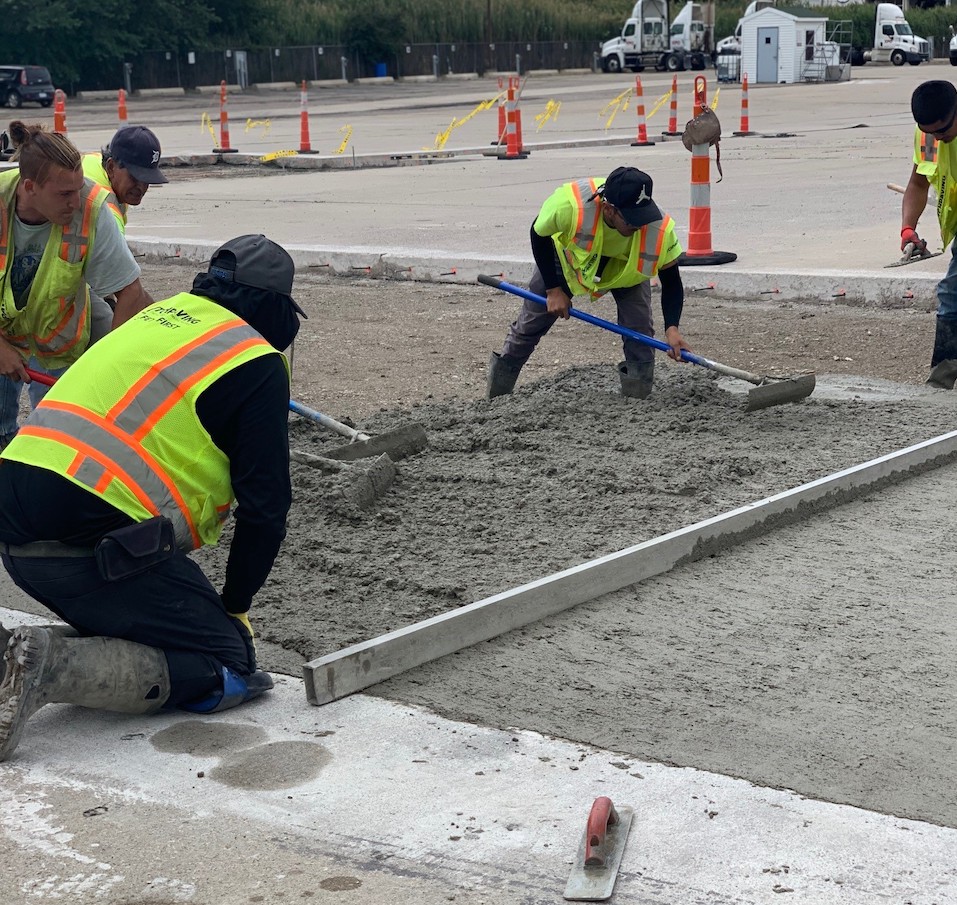
Comprehending the Necessary Duty of a Concrete Contractor in Modern Building and Style
Concrete service providers are important to the building and construction and layout sectors. Their proficiency assurances that structures are not just durable but additionally visually pleasing. They involve in different responsibilities, from task planning to quality assurance, and collaborate with designers and designers. With progressing trends and innovations, their duty is extra crucial than ever before. Recognizing their impact can reveal insights right into contemporary construction techniques and the future of building style.
The Relevance of Concrete in Construction
Although different materials are used in building, concrete continues to be a keystone of contemporary building techniques as a result of its adaptability, strength, and longevity. This composite product, made from concrete, water, and accumulations, can hold up against considerable stress and anxiety and is immune to fire, climate, and pests, making it excellent for diverse applications. Concrete's adaptability permits it to be built into different forms and dimensions, promoting cutting-edge building styles.
Additionally, its thermal mass residential or commercial properties add to energy effectiveness, helping to control indoor temperature levels. The extensive schedule of basic materials and the reasonably inexpensive of concrete additionally improve its allure for large-scale jobs, from business buildings to infrastructure like bridges and roads. As urbanization remains to rise, the demand for lasting and reputable structure materials solidifies concrete's essential duty in building and construction, making it a fundamental choice for builders and engineers intending for long life and strength in their jobs.
Secret Responsibilities of a Concrete Service provider
Concrete contractors play a crucial duty in the construction process, with a number of vital duties that guarantee project success. Their tasks include job planning and layout, material option and administration, along with preserving quality assurance and guarantee throughout the project lifecycle. Comprehending these duties is important for valuing the specialist's influence on building end results.
Project Planning and Design
When beginning on a building project, reliable job preparation and style play a crucial duty in a concrete contractor's duties. The specialist should work together carefully with clients, engineers, and designers to comprehend the job's objectives and requirements. This involves reviewing website problems, examining layout demands, and determining the extent of job. A concrete specialist is additionally accountable for developing budget plans and timelines, ensuring that all phases of the project straighten with overall purposes. Additionally, they have to anticipate potential difficulties and develop options to keep job performance. By carefully planning and creating each facet of the concrete work, the service provider establishes the foundation for effective implementation, guaranteeing architectural stability and adherence to security criteria throughout the construction process.
Product Choice and Administration
Reliable material selection and monitoring are important obligations for a concrete contractor, as these decisions straight affect the quality and longevity of the last framework. Concrete professionals should evaluate numerous materials, including aggregates, admixtures, and reinforcement kinds, to guarantee they satisfy task specifications and ecological problems. They have to take into consideration aspects such as toughness, resistance, and workability to weathering. In addition, handling the supply chain is important, as prompt distribution of products can incredibly influence task timelines. Specialists should preserve partnerships with distributors to secure top notch resources while also keeping an eye on stock levels to avoid excesses or lacks. Ultimately, this mindful choice and administration of products add to the general success of building projects and the longevity of the frameworks built.
Quality Assurance and Assurance
Quality assurance and guarantee are extremely important in the construction sector, especially for concrete service providers entrusted with delivering trusted and resilient structures. Concrete contractors must apply extensive quality assurance measures throughout the construction procedure, guaranteeing that all materials meet specified requirements and laws (Concrete Contractor in Dallas). This consists of keeping track of the blending, pouring, and healing processes to avoid problems and enhance structural integrity. Regular assessments are essential, allowing service providers to determine and correct issues immediately. In addition, concrete specialists usually work together with engineers and designers to guarantee that the last item aligns with design specifications. By adhering to rigorous quality control procedures, concrete service providers not only guard the long life of their job but additionally support the trust fund of customers and stakeholders in the construction industry
Kinds of Projects Handled by Concrete Service Providers
Although concrete service providers are typically linked with large building and construction projects, their expertise includes a varied array of applications. These professionals are essential to household projects, such as foundations, driveways, and patio areas, guaranteeing sturdiness and aesthetic allure. In industrial building and construction, they contribute to the creation of floorings, pathways, and structural elements that satisfy certain layout and safety and security requirements.
Concrete specialists are involved in infrastructure projects, consisting of passages, roads, and bridges, where their skills assure architectural stability and durability. They also play an essential function in decorative concrete applications, such as stamped concrete and polished surface areas, which enhance the appearance of different spaces. Furthermore, their solutions include repair and maintenance job, attending to issues like breaking or disintegration in existing structures. This convenience underscores the essential function concrete specialists play in both functional and ornamental facets of modern-day construction and design.
Abilities and Credentials Needed
Concrete professionals have to possess a diverse set of abilities and credentials to effectively manage the series of jobs they undertake. Efficiency in concrete mixing, putting, and finishing is important, as is a solid understanding of various kinds of concrete, including strengthened and decorative choices. Expertise of construction strategies, blueprints, and project management principles is crucial for effective execution.
Moreover, physical stamina and toughness are vital because of the requiring nature of the job. Contractors must also have strong analytical capabilities to resolve unanticipated obstacles during projects. Interaction abilities are critical for collaborating with clients, engineers, and various other tradespeople.
In addition, obtaining appropriate certifications can enhance a professional's integrity and broaden their occupation possibilities. Continuous education and learning in new techniques and materials maintains specialists affordable in a swiftly evolving sector. These certifications and abilities jointly allow concrete service providers to supply premium outcomes successfully and successfully.
The Role of Concrete Specialists in Security Compliance
Making certain safety and security compliance is a fundamental responsibility of concrete professionals, as they browse the complexities of building and construction websites. These professionals are charged with adhering to rigorous safety policies and standards, which are critical for protecting against crashes and making certain the wellness of all site employees. TJ Concrete Contractor. Concrete professionals should carry out comprehensive security plans this post that include training personnel on proper equipment usage and security methods
Furthermore, they are in charge of inspecting materials and job processes to determine possible threats. By conducting regular safety and security audits and risk assessments, concrete professionals can proactively address problems prior to they rise. They team up with other construction specialists, such as engineers and project supervisors, to integrate security procedures right into the overall task approach. Ultimately, the commitment of concrete service providers to safety and security compliance not just protects employees however additionally boosts project efficiency and top quality, strengthening their vital duty in modern-day building.
Fads and Innovations in Concrete Design
Current developments in concrete design have actually presented a range of fads and technologies that focus on sustainability and visual appeals. Sustainable concrete remedies, decorative completing methods, and clever concrete technologies are reshaping the industry. These advancements not only improve architectural honesty yet additionally add to ecologically responsible construction methods.
Sustainable Concrete Solutions
As the building industry progressively focuses on sustainability, ingenious concrete solutions are emerging to minimize environmental impact while improving efficiency. One popular pattern is making use of recycled materials, such as smashed concrete and industrial byproducts, which not only decreases waste but additionally enhances the concrete's buildings. Advancements in admixtures, consisting of fly ash and slag, contribute to decreased carbon emissions throughout manufacturing. One more substantial innovation includes the growth of absorptive concrete, which enables water to move via and minimizes drainage, mitigating flooding and groundwater exhaustion. Additionally, the increase of carbon capture modern technologies in concrete production holds promise for additional discharges decrease. These lasting concrete options exemplify the industry's dedication to environmentally liable construction practices.

Ornamental Completing Strategies
A wide variety of decorative ending up methods have actually emerged in concrete style, transforming plain surfaces into visually striking aspects. Techniques such as stamping, staining, and brightening permit for a vast array of visual possibilities, dealing with varied layout preferences. Stamped concrete mimics all-natural materials like rock and brick, while staining introduces vibrant shades that enhance the surface area's appeal. Polished concrete, recognized for its streamlined finish, includes refinement to both industrial and her latest blog residential rooms. Additionally, microtopping and overlay systems provide cutting-edge options for renewing existing concrete. These techniques not just improve the visual features yet also enhance sturdiness and maintenance. As patterns progress, the assimilation of ornamental coatings proceeds to play a crucial role in modern construction, weding functionality with artistic expression.

Smart Concrete Technologies
While conventional concrete remains a staple in building and construction, the appearance of smart concrete innovations is revolutionizing the industry by integrating advanced functions that improve performance and sustainability. These innovations consist of self-healing concrete, which makes use of ingrained germs that activate upon fracturing, and sensor-equipped concrete that monitors structural health and wellness in real-time. Furthermore, piezoelectric and thermochromic concrete can adapt to ecological adjustments and create electricity, respectively. The implementation of eco-friendly ingredients and recycled products also adds to decreasing the carbon impact of concrete manufacturing. As these innovations continue to advance, they guarantee to enhance durability, reduced upkeep prices, and promote greener building practices, making them essential for future building projects. The function of concrete specialists is increasingly considerable in taking advantage of these advancements.
Regularly Asked Questions
What Elements Influence Concrete Prices in Building Projects?
Concrete pricing in building and construction projects is influenced by material prices, labor costs, task dimension, area, availability of sources, and market demand. Seasonal aspects and transport prices can additionally considerably influence the total rates framework.
How Do Weather Condition Conditions Influence Concrete Job?
Weather greatly affect concrete job; extreme temperature levels, moisture, and precipitation can affect establishing times, treating procedures, and overall quality - Concrete Contractor Near Me. Service providers should adjust their routines and techniques to reduce these ecological impacts for successful task conclusion
What Is the Regular Timeline for a Concrete Project?
A regular concrete job timeline varies from a couple of days to a number of weeks. Aspects affecting this duration include task dimension, complexity, weather, and treating times, which jointly establish the general completion timetable.
Can Concrete Contractors Assist With Style Examinations?
Concrete service providers can indeed aid with layout examinations, providing valuable understandings on product choice, structural honesty, and aesthetic alternatives, making sure that tasks satisfy both functional demands and the customer's vision for the completed item.
What Are Usual False Impressions Regarding Concrete Longevity?
Usual mistaken beliefs regarding concrete toughness consist of the belief that it is unsusceptible harm and that all kinds are similarly strong. In truth, factors like mix layout, environmental problems, and maintenance substantially affect concrete's long-term efficiency.
They additionally play a critical duty in attractive concrete applications, such as stamped concrete and polished surfaces, which improve the visual aspect of various spaces. Effectiveness in concrete Get More Info blending, putting, and finishing is important, as is a solid understanding of different types of concrete, including reinforced and attractive choices. One prominent fad is the use of recycled products, such as smashed concrete and commercial byproducts, which not just reduces waste but additionally improves the concrete's properties. While typical concrete remains a staple in building, the emergence of wise concrete technologies is transforming the industry by integrating innovative functions that improve performance and sustainability. These developments include self-healing concrete, which makes use of embedded germs that activate upon cracking, and sensor-equipped concrete that monitors architectural wellness in real-time.